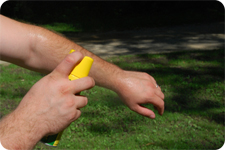Why aren't citronella wrist bands available in Canada?
Because no one has been able to satisfy Health Canada that they are actually safe...
Below is more information on Health Canada's reasoning behind this.
Citronella is an essential oil obtained from various species of lemongrass, where the leaves and stems are dried out and the oil is extracted. It can grow up to 1.5m and is grown in Sri Lanka, India, Burma and Indonesia. Also, it is related to the lemon grasses used in Southeast Asian cooking.
Because no one has been able to satisfy Health Canada that they are actually safe...
Below is more information on Health Canada's reasoning behind this.
Citronella is an essential oil obtained from various species of lemongrass, where the leaves and stems are dried out and the oil is extracted. It can grow up to 1.5m and is grown in Sri Lanka, India, Burma and Indonesia. Also, it is related to the lemon grasses used in Southeast Asian cooking.
Health Canada reviewed the information
available on ‘citronella-based personal insect repellents’ that get applied
directly to the skin, in 2004. They found that there was a not a lot of safety
data that supported the products continued registration, but Health Canada did
not find any impending health risks. The product is allowed to stay on the
market until a final decision is made.
Products that are registered by Health
Canada containing citronella only protect people from mosquito bites for up to
2 hours, and should not be used on infants or toddlers. As well, certain
citronella products have a limit to the number of applications allowed each
day.
Health Canada’s Pest Management
Regulatory Agency (PMRA) is responsible for the registration and re-evaluation
of pesticides in Canada. On September 17, 2004, they re-evaluated the
information that is available for citronella-based personal insect repellents
that are applied directly to the skin and are recommending that these products
be phased out. The phase out and re-evaluation does not apply to other uses of
citronella, for example; in candles, as a scent in cosmetics, and as a food
additive.
The results of the re-evaluation from
Health Canada were as follows:
“Insect
repellents are often applied directly to the skin, over a relatively large area
of the body, which leads to high exposures. Because citronella-based products
repel insects for approximately 30 minutes, repeated applications can lead to
even greater exposures. While no imminent health risks were identified with the
use of these products, the companies marketing them have not provided adequate
safety data to support their continued registration. The limited data available
for citronella-based insect repellents has brought a number of concerns to
light. Natural citronella oil may contain methyleugenol, which has been shown
to be carcinogenic in animal studies. In addition, tests in laboratory animals
indicate a potential for reproductive and developmental toxicity as well as fetal
sensitivity at high dose levels. As a result, the PMRA was unable to conclude
that the use of citronella-based personal insect repellents continues to be
acceptable and is proposing to phase out this use.
Details of the
scientific rationale for the proposed decision are included in PACR2004-36,
Re-evaluation of Citronella Oil and Related Active Compounds for Use as
Personal Insect Repellents, available on the PMRA's website. As part of the
PMRA's re-evaluation process, interested parties had until 17 November 2004 to
provide further information or comments prior to finalization of the
re-evaluation decision by the PMRA. Manufacturers can also commit to generating
the data required to address the uncertainties identified during the
re-evaluation.
Citronella-based
personal insect repellents will remain on the market during this consultation
period. They will also remain on the market until any information received
during the consultation has been assessed and a final decision has been
reached. If no additional information is provided during the comment period to
warrant a change in the current PMRA proposal, a phase-out schedule will be
announced at the time the final decision is communicated.”[1]
Please see http://www.hc-sc.gc.ca/cps-spc/pubs/pest/_fact-fiche/citron/index-eng.php for more information


No comments:
Post a Comment